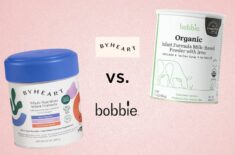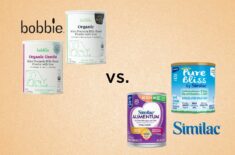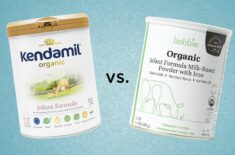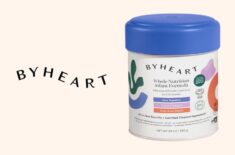Overview
Milk allergies are among the most common types of food allergies in children. But while cow’s milk protein is the usual cause of allergy, milk from other mammals such as goats, buffalo, and sheep can also cause a reaction. (1)
A milk allergy can be potentially life-threatening, unlike lactose intolerance or other food sensitivities that may only cause discomfort. (1)
How Do You Know If Your Baby Needs Hypoallergenic Formula?
Symptoms of cow’s milk protein allergy or other food allergies can include the following: (1)
- Wheezing
- Hives
- Swelling of the tongue, lips, or throat
- Itching or tingling around lips or mouth
- Coughing
- Shortness of breath
- Vomiting
At times, this food allergy may also show the following signs and symptoms: (1)
- Loose stools or diarrhea, which can contain blood
- Abdominal cramps
- Runny nose
- Watery eyes
- Colic, fussiness, or gas in babies
A severe allergic reaction can cause airway obstruction, which can block your child’s breathing. (1)
No matter how mild the symptoms might be, it’s important to tell your child’s pediatrician so that a proper diagnosis can be made. It can ensure your child’s safety in the future. (1)
What Is A Hypoallergenic Baby Formula?
There’s no cure for allergies, but it may be prevented by avoiding the allergens that trigger the reaction. If your kid has a cow’s milk allergy, then it makes sense to avoid any formula with dairy. This also goes for goat’s milk and similar dairy products. (1)(2)
You might be surprised to learn that as many as 8-14% of children with a cow’s milk protein allergy may also have soy allergies. (3)
If your child has milk, soy, or other food allergies, you can give them breast milk or hypoallergenic baby formula. (1)
- Fully hydrolyzed formulas have their proteins broken down into the tiniest pieces that no longer cause an allergic reaction.
- Amino acid-based formulas have their proteins further broken down into free amino acids, the building blocks of proteins. Because they don’t have any intact proteins, they’re fully hypoallergenic.
You can find our recommendations below. But always consult your pediatrician before making any changes to your child’s formula.
What Is The Best Formula For Babies With Milk Allergy?
The following are some of the top formulas that you can pick for your little one:
Baby’s Only Organic Pea Protein Formula – $14.99 for 12.7 oz tub
- It’s a value-friendly organic formula that only costs $1.18 per oz.
- It may be the only pea-based formula currently available.
Enfamil Nutramigen Hypoallergenic Colic Baby Formula – $45.99 for 19.8 oz tub
- The brand claims that it’s clinically proven to reduce colic in 48 hours.
Similac Alimentum – $39.99 for 19.8 oz tub
- The brand claims that it’s clinically proven to reduce crying due to protein sensitivity in 24 hours.
Nestlé Alfamino Infant Formula – $39.89 for 14.1 oz tub
- It contains higher calcium levels which can support your baby’s bone development.
PurAmino Hypoallergenic Infant Formula – $48.99 for 14.1 oz tub
- It’s an amino acid-based formula.
- It contains DHA (docosahexaenoic acid), fatty acids that can help promote brain development. (4)
- It also has ARA (arachidonic acid), fatty acids that can support your baby’s growth and health. (5)
- It’s also iron-fortified to meet your baby’s nutritional needs.
Similac Elecare – $44.97 for 14.1 oz tub
- It’s an amino acid-based formula that contains prebiotics.
Neocate Infant DHA/ARA (Hypoallergenic) – $39.12 for 14.1 oz tub
- It’s an amino acid-based formula with nucleotides that may support growth and a better immune system for your baby. (6)
- It also has brain-boosting DHA and ARA. (4)(5)
Read on for more information about each hypoallergenic infant formula.
Baby’s Only Organic Pea Protein Formula
Price
- 12.7 oz tub: $14.99
- 12.7 oz tub, case of six: $89.94
- 12.7 oz tub, case of 12: $179.88
Best Features & Safety
- The brand claims that this is the only pea formula currently available for sale.
- It’s plant-based and can be suitable for vegetarian or Kosher diets.
- It has essential fatty acids that may promote brain and eye development.
- It’s a toddler formula with non-GMO ingredients (it’s free from genetically modified organisms).
Ingredients
- Organic pea protein concentrate
- Organic coconut oil
- Organic brown rice syrup
- Organic high oleic oil (sunflower or safflower)
- Organic canola oil
- Organic linoleic sunflower oil
- Organic sunflower lecithin
Nutrition Facts
Each serving (4 fl oz) contains:
- Calories: 80 calories
- Total fats: 4 g
- Protein: 2 g
- Total carbohydrates: 9 g
- Vitamin A: 70 mcg
- Vitamin D: 1.3 mcg
- Vitamin K: 7 mcg
- Choline: 10 mg
- Vitamin E: 1.1 mg
- Iron: 1.4 mg
- Calcium: 90 mg
- Potassium: 110 mg
Product Recall
- None
Pros & Cons
Pros
- It’s a non-GMO toddler formula.
- It’s OU (Orthodox Union) certified Kosher.
- It’s free from pesticides, insecticides, or weed killers like glyphosate.
- It’s also free from glucose and corn syrups.
- It doesn’t have palm oil or palm olein oil, a common component of many formulas that can cause decreased calcium absorption and lower bone density. (7)
Cons
- It may meet the guidelines set by the AAP (American Academy of Pediatrics) and the Infant Formula Act for baby formula composition. But according to the company’s website, pea protein-based formulas haven’t been approved for commercial use.
- This formula is only for children above 12 months of age.
- It has brown rice syrup (processed sweetener).
- It also contains processed vegetable oils, such as canola oil.
What Customers Say
Positive Reviews
“I started this formula when my son was 4months old and it has been great he loves it and… I love that the ingredients has most the nutrients needed for development without having harsh chemicals or dairy products!!!.’” – Reviewer on Nature’s One.
Negative Reviews
“My baby didn’t do well he had a skin reaction.” – Reviewer on Nature’s One.
Enfamil Nutramigen with Enflora LGG
Price
- 19.8 oz tub: $45.99
- 12.6 oz tub: $34.99
- 27.8 oz tub: $58.99
Best Features & Safety
- According to Enfamil’s website, this formulation is clinically proven to reduce colic from cow’s milk allergies within 48 hours.
- The website also claims that this formula may help reduce the incidence of future allergies (like asthma, eczema, hives, or allergic rhinitis).
- It has probiotic cultures LGG (Lactobacillus rhamnosus GG) to help your baby have a healthier digestive system. (8)
- It contains DHA to support your baby’s brain development. (4)
Ingredients
- Corn syrup solids
- Modified casein hydrolysate
- Modified corn starch
- Vegetable oils (coconut, soy, high oleic sunflower, or palm olein oil)
- Lactobacillus rhamnosus (probiotics)
- Mortierella alpina oil (for ARA)
- Schizochytrium sp. oil (for DHA)
Nutrition Facts
Each serving (5 fl oz) contains:
- Calories: 100 calories
- Total fats: 5.3 g
- Protein: 2.8 g
- Total carbohydrates: 10.3 g
- Vitamin E: 2 IU
- Iron: 1.8 mg
- Calcium: 94 mg
- Choline: 24 mg
- Iodine: 15 mcg
Product Recall
In 2001, Nutramigen was recalled due to potentially dangerous preparation instructions (written in Spanish) incorrectly printed on the label. Following the incorrect instructions can cause serious health issues or even death. (9)
The recall included the 16-ounce powder and the 32-ounce ready-to-feed liquid formula. (9)
Pros & Cons
Pros
- It’s free from artificial growth hormones, table sugars, or sucrose.
- It’s a lactose-free formula.
Cons
- It has palm olein oil.
- It also contains soy oil. Although highly refined soy oil doesn’t have soy proteins that can trigger allergic reactions, you might want to keep this processed oil from your baby’s diet. (10)
- It also has other questionable vegetable oils.
- It can cost more than regular formulas.
- It had a recall. (9)
What Customers Say
Positive Reviews
“My baby had no issues switching from breast milk to this when I could produce enough for him.” – Reviewer on Enfamil’s website.
Negative Reviews
“I give a 1 star only because it made my son projectile vomiting after each bottle until it was time to feed him again.” – Reviewer on Enfamil’s website.
Similac Alimentum Hypoallergenic Formula
Price
- 19.8 oz tub: $39.99
- 12.1 oz tub: $28.99
- 19.8 oz tub, four-pack: $167.99
Best Features & Safety
- It’s an extensively hydrolyzed formula based on casein.
- It’s clinically proven to be hypoallergenic. (11)
- It has MCT oil (medium-chain triglycerides) that can be easier for your baby’s still-developing digestive system to absorb.
Ingredients
- Casein hydrolysate
- Corn maltodextrin
- Sugar
- Soy oil
- High oleic safflower oil
- Crypthecodinium cohnii oil (for DHA)
- Mortierella alpina oil (for ARA)
- Medium-chain triglycerides
Nutrition Facts
Each serving (5 fl oz) contains:
- Calories: 100 calories
- Total fats: 5.54 g
- Protein: 2.75 g
- Total carbohydrates: 10.2 g
- Iron: 1.8 mg
- Calcium: 105 mg
- Vitamin A: 300 IU
- Vitamin C: 9 mg
Product Recall
Though there hasn’t been any recall on the powder formula, the 32-oz ready-to-feed Similac Alimentum formula was recalled due to a manufacturing defect in September 2006. (12)
The formula bottles lack a special layer that can keep air out. It caused the vitamin C content inside the bottles to decrease because their contents reacted with air. (12)
Though the formula may still be safe for your baby to drink, the lower vitamin levels can lead to a nutrient deficiency. (12)
Babies who drink formulas with low levels of this vitamin for at least two weeks can begin showing the following signs of vitamin C deficiency: (12)
- Easy bruising
- Irritability with generalized tenderness
- Paleness
- Fatigue
Thankfully, only one lot (401895V) was affected by this recall, and no medical complaints have been reported. (12)(13)
Pros & Cons
Pros
- It doesn’t contain palm olein oil, a common component in some formulas that may affect calcium absorption. (7)
Cons
- It has corn maltodextrin, added sugars, and highly processed vegetable oils.
- It also contains soy oil.
- You are required to store the opened can in cool temperatures.
What Customers Say
Positive Reviews
“This formula has been working wonders for my son with a milk protein allergy.” – Reviewer on Similac’s website.
Negative Reviews
“The smell is AWFUL, the taste is AWFUL and after 4 days of my newborn eating this, he has decided to stop eating.” – Reviewer on Similac’s website.
Nestle Alfamino Infant Formula
Price
- 14.1 oz tub: $39.89
- 14.1 oz tub, six-pack: $239.34
Best Features & Safety
- It’s an amino acid-based formula that can provide complete nutrition for your baby’s first year.
- It has a unique fat blend with MCTs (medium-chain triglycerides) that may help if your child has fat malabsorption.
- It contains linoleic acid that may support your baby’s healthy heart development. (14)
- It’s free from lactose and gluten.
Ingredients
- Medium chain triglycerides
- Potato starch
- Corn syrup solids
- Vegetable oils (soybean, high-2 palmitic vegetable, or high oleic sunflower oils)
- Mortierella alpina oil (source of ARA)
- Crypthecodinium cohnii oil (source of DHA)
Nutritional Facts
Each serving (5 fl oz) contains:
- Calories: 100 calories
- Total fats: 5 g
- Protein: 2.8g
- Total carbohydrates: 11 g
- Linoleic acid: 696 mg
- Vitamin A: 315 IU
- Vitamin C: 15 mg
- Choline: 24 mg
- Iron: 1.8 mg
- Calcium: 119 mg
Product Recall
Nestle Germany recalled Alfamino Amino Acid Infant Formula in December 2018 because of a formulation error that can make your baby sick. (15)
This erroneous blend has higher levels of minerals that may cause nausea, vomiting, or headaches. (15)
Only one lot (80250346GA) was affected by this recall. (15)
According to the advisory, the recalled blend may turn green or grey when mixed with water. (15)
Pros & Cons
Pros
- Because it’s made of free amino acids, it may be easier to digest.
- It’s free from lactose, gluten-free, and other potential allergens.
Cons
- It’s not suitable if your baby has galactosemia (it’s a condition wherein your baby can’t digest galactose, a type of sugar found in milk products).
- Only use this formula with medical supervision.
- It contains corn syrup and questionable vegetable oils.
- It had a recall in 2018. (15)
- It may cost much more than regular formulas.
What Customers Say
Positive Reviews
“So thankful for this formula. My infant has FPIES and malabsorption and this is the only elemental formula with 10% more MCT oil than the others and actually helps him gain weight.” – Reviewer on Amazon.
Negative Reviews
“It gave my baby a horrible reaction he was extremely fussy and gassy.” – Reviewer on Amazon.
PurAmino Hypoallergenic Infant Formula
Price
- 14.1 oz tub: $48.99
- 14.1 oz tub, case of four: $171.99
Best Features & Safety
- It’s a hypoallergenic, amino acid-based formula.
- It contains DHA and ARA to help improve your baby’s brain and health. (4)(5)
- It’s fortified with iron.
Ingredients
- Amino acids
- Medium-chain triglyceride oils
- Corn syrup solids
- High oleic sunflower oil
- Soy oil
- Mortierella alpina oil
- Schizochytrium sp. oil
- Taurine
- Modified tapioca starch
Nutrition Facts
Each serving (5 fl oz) contains:
- Calories: 100 calories
- Total fats: 5.3 g
- Protein: 2.8 g
- Total carbohydrates: 10.6 g
- Iron: 1.8 mg
- Calcium: 116 mg
- Linoleic acid: 860 mg
- Vitamin C: 12 mg
- Potassium: 110 mg
- Iodine: 15 mcg
Product Recall
- None
Pros & Cons
Pros
- It can be your baby’s sole nutrition source until they’re six months old.
- If medically indicated, it may still be used as a milk substitute for kids up to 24 months old. But always check with your kid’s pediatrician before starting a new formula.
Cons
- It has corn syrup solids, highly processed vegetable oils, and soy oil.
- It may have a stronger scent than other formula options.
- It can cause poop discoloration.
- It costs several times more than regular formulas.
What Customers Say
Positive Reviews
“Started my son on this at a month old and he is doing so much better!” – Reviewer on Enfamil’s website.
Negative Reviews
“This product is terrible. It smelled like Clorox. bleach. Whatever you do, never ever give this product to your child or use for any sort of human consumption.” – Reviewer on Amazon.
Similac Elecare
Pricing
- 14.1 oz tub: $44.97
Best Features & Safety
- This amino-acid-based baby formula is made for special medical purposes.
- It contains prebiotics 2’-FL HMO (2’-fucosyllactose human milk oligosaccharide) that are abundant in breast milk and can promote a healthier immune system.
- It contains ARA and DHA, essential fatty acids that can promote better brain development. (4)(5)
Ingredients
- Amino acids
- Corn syrup solids
- Vegetable oils (high oleic safflower oil, soy oil, and MCT oil from palm kernel oil and coconut oil)
- M. alpine oil (ARA)
- C. cohnii oil (DHA)
- 2’-fucosyllactose prebiotics (derived from lactose)
- Emulsifier: E1450 (modified starch)
Nutritional Facts
Every serving (5 fl oz) contains:
- Calories: 100 calories
- Total fats: 4.8 g
- Total carbohydrates: 10.7 g
- Proteins: 3.1 g
- Vitamin A: 273 IU
- Vitamin C: 9 mg
- Iron: 1.8 mg
- Calcium: 116 mg
- Iodine: 8.9 mcg
- Potassium: 150 mg
Product Recall
- None
Pros & Cons
Pros
- It’s designed for babies from birth to 12 months old.
- It can be suitable for vegetarians.
- It’s free from soy oil.
Cons
- It may cost more than traditional milk formulas.
- It contains corn syrup and vegetable oils.
- It also has maltodextrin. Though it’s not listed on the package, maltodextrin is identified as a carbohydrate source on Elecare’s datasheet, as posted by its parent company Abbott Nutrition. (16)
- It may have a stronger scent than regular formulas.
- It can cause discolored poops.
What Customers Say
Positive Reviews
“My 3 month old has been having reflux and major gas pains. We’re trying EleCare per doctors recommendation after trying a few others and it seems to be working!” – Reviewer on Walmart.
Negative Reviews
“Loose stools. Smells awful! Expensive!” – Reviewer on Amazon.
Neocate Infant DHA/ARA
Price
- 14.1 oz tub: $39.12
- 14.1 oz tub, case of four: $161
- 14.1 oz tub, case of four: $313
Best Features & Safety
- It contains free amino acids.
- It also has added nucleotides, which can support your baby’s growth and healthier immune system. (6)
- It also contains DHA and ARA that may support infant growth, brain development, and health. (4)(5)
Ingredients
- Amino acids
- Corn syrup solids
- Nucleotides
- Refined vegetable oil (medium-chain triglycerides)
- Canola oil
- High oleic sunflower oil
- Sunflower oil
- Mortierella alpina oil (source of ARA)
- Crypthecodinium cohnii oil (source of DHA)
- Taurine
Nutritional Facts
Each serving (5 fl oz ) contains:
- Calories: 100 kcal
- Total fats: 5.1 g
- Protein: 2.8 g
- Total carbohydrates: 10.8 g
- Iron: 1.5 mg
- Calcium: 116 mg
- Linoleic acid: 738 mg
- Vitamin C: 10.7 mg
- Potassium: 109 mg
- Iodine: 20.7 mg
Product Recall
In 2009, the Neocate Infant Specialized formula was recalled due to a blending error in one batch/lot. The faulty formula has a slightly lower protein content than the FDA requirements. (17)(18)
The minimum protein requirement in US infant formulas is 1.8 g per 100 kcal. Though Neocate usually has 2.8 g (based on the nutrition value posted on the can), the faulty formula had a reduced protein content/equivalent of 1.75 g protein per 100 kcal. (17)(18)
This recall affected only one lot (P91877). The formula itself is safe for consumption, but the recall advisory warned that long-term consumption could affect your baby’s growth. (17)
Pros & Cons
Pros
- It can provide complete nutrition if your baby has certain dietary restrictions during their first year. But always consult with your pediatrician or healthcare provider before giving it (or any new formula) to your child.
- It’s made in a certified dairy-free facility.
- It’s also free from soy oil, potential allergens, artificial colors, flavors, or sweeteners.
- It’s halal and Kosher certified.
Cons
- It’s considered a specially formulated medical food/formula that should only be used with your pediatrician’s advice.
- It has corn syrup and highly processed vegetable oils.
- It can be more difficult to dissolve than regular formula options.
- It may cost several times higher than most dairy formulas.
- It had a recall in 2009. (17)
- It may cause poop discoloration, but Neocate claims it’s normal because the human body processes amino acids differently.
- Studies have shown that prolonged use of Neocate may cause GERD (gastroesophageal reflux disease) and rickets (soft, weak bones). Babies that don’t receive calcium supplements are more susceptible to these adverse effects. (19)(20)(21)
What Customers Say
Positive Reviews
“The only formula my baby can handle due to a protein allergy. It’s expensive but it comes sealed and packed appropriately.” – Reviewer on Amazon.
Negative Reviews
“My daughter has a protein intolerance, milk allergy, and severe reflux. We tried this at about 2 months and she projectile vomited EVERY time we fed her.” – Reviewer on Amazon.
Summary And Recommendations
If you need a hypoallergenic formula, you can pick the following:
- Baby’s Only Organic Pea Protein Formula – if you prefer a value-friendly organic formula or if you want your baby to try the only pea formula currently available.
- Enfamil Nutramigen Colic Baby Formula – if you prefer a formula that’s clinically proven to reduce colic in just 48 hours.
- Similac Alimentum – if you prefer a clinically proven formula that can reduce crying because of protein sensitivity within 24 hours.
- Nestlé Alfamino Infant Formula – if you prefer an amino acid-based formula with higher calcium levels for your baby’s bone development.
- PurAmino Hypoallergenic Infant Formula – if you want an iron-fortified, amino acid-based formula with DHA and ARA.
- Similac Elecare – if you want to pick an amino acid-based formula with prebiotics.
- Neocate Infant Hypoallergenic Formula with DHA/ARA – if you want an amino acid-based formula with nucleotides to support growth and a healthier immune system.
But don’t forget to consult your pediatrician before giving any of these formulas to your baby.
Different Types Of Hypoallergenic Formulas
Standard formulas are often made from cow’s milk. But your pediatrician might suggest hypoallergenic formulas if your child has sensitivity or allergy to cow’s milk and soy protein.
Plant-Based Formulas
Plant-based formulas are dairy-free, but it may be best to avoid the ones that contain soy. (3)
Examples are:
- Baby’s Only Organic Pea Protein Formula
Formulas With Hydrolyzed Proteins
Regular formulas often use cow’s milk which contains casein and whey. Both can trigger an allergic reaction. (3)
But researchers discovered that if these proteins are broken down into smaller parts, called peptides, they’re less likely to trigger a reaction. (3)
Note that partially hydrolyzed formulas aren’t truly hypoallergenic. They may still cause allergies. You shouldn’t pick these if your baby has cow’s milk protein allergies. (3)
But they may be best suited for babies with acid reflux, colic, fussiness, and spit-up due to lactose intolerance. (3)
Examples of partially hydrolyzed formulas:
- Gerber Good Start Gentle
- Similac Pro-Total Comfort
If your little one has food allergies, your pediatrician might recommend an extensively hydrolyzed formula. (3)
Examples are: (3)
- Enfamil Nutramigen
- Enfamil Pregestimil
- Similac Alimentum
- Similac Expert Care
Formulas With Free Amino Acids
If your child can’t tolerate the extensively hydrolyzed formulas, then your pediatrician might recommend amino acid-based options. (3)
These formulas have their proteins further broken down into the basic components or building blocks that make them hypoallergenic. But these formulas may be considered a last resort, especially because they taste and smell so differently from regular formulas. (3)
Also, amino acid-based formulas can cost several times the price of traditional formulas. They might make you worry about poop-discoloration issues, too.
Examples of these formulas are the following:
- Neocate
- Similac EleCare
- Enfamil PurAmino
- Nestle Alfamino
Soy Formulas
If your child has dairy allergies but doesn’t react to soy, you can opt for these formulas:
- Gerber Good Start Soy
- Enfamil ProSobee Soy-Based Infant Formula
- Similac Soy Isomil Infant Lactose-Free Formula
- Parent’s Choice Soy Infant Formula
- Earth’s Best Non-GMO Soy-Based Infant Formula
REFERENCES
(1) https://www.mayoclinic.org/diseases-conditions/milk-allergy/symptoms-causes/syc-20375101
(2) https://pubmed.ncbi.nlm.nih.gov/12882742/
(3) https://www.kidswithfoodallergies.org/formula-options-for-infants-with-food-allergies.aspx
(4) https://pubmed.ncbi.nlm.nih.gov/10479465/
(5) https://www.ncbi.nlm.nih.gov/pmc/articles/PMC4848685/
(6) https://pubmed.ncbi.nlm.nih.gov/12410863/
(7) https://pubmed.ncbi.nlm.nih.gov/8780336/
(8) https://www.ncbi.nlm.nih.gov/pmc/articles/PMC4155824/
(9) https://www.nytimes.com/2001/07/10/us/national-briefing-science-and-health-recall-of-baby-formula.html
(10) https://www.kidswithfoodallergies.org/soy-allergy.aspx
(11) https://pubmed.ncbi.nlm.nih.gov/2007924/
(12) https://www.aappublications.org/content/27/9/2006229
(13) https://www.cbsnews.com/news/huge-recall-of-similac-baby-formula/
(14) https://www.ncbi.nlm.nih.gov/pmc/articles/PMC7469037/
(15) https://www.reuters.com/article/us-nestle-recall-idUKKBN1O50I2
(16) https://www.abbottnutrition.ie/downloads/10-EleCare-datasheet-HCP-version-3-Jan-020.pdf
(17) https://www.aappublications.org/content/early/2009/10/01/aapnews.20091001-1
(18) https://www.accessdata.fda.gov/scripts/cdrh/cfdocs/cfcfr/cfrsearch.cfm?fr=107.100
(19) https://pubmed.ncbi.nlm.nih.gov/31143989/
(20) https://pubmed.ncbi.nlm.nih.gov/30314926/
(21) https://pubmed.ncbi.nlm.nih.gov/28167344/












